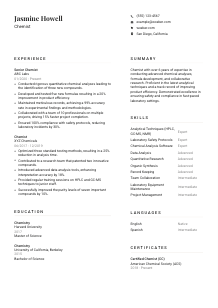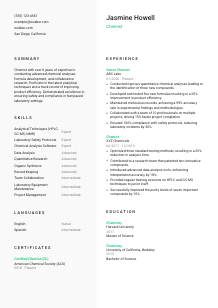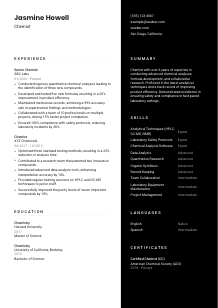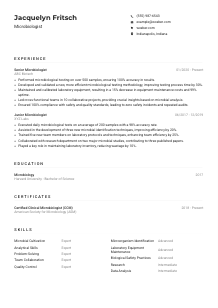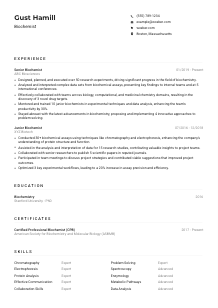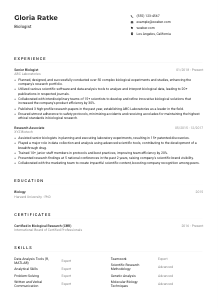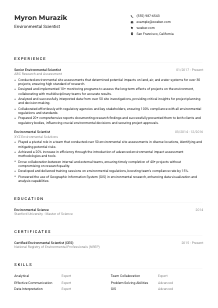Chemist CV Example
Bonding elements, but your CV lacks cohesion? Dive into this Chemist CV example, distilled using Wozber free CV builder. Uncover how to blend your chemical expertise and analytical acumen to align with job requirements, crafting a career as reactive and dynamic as your experiments!
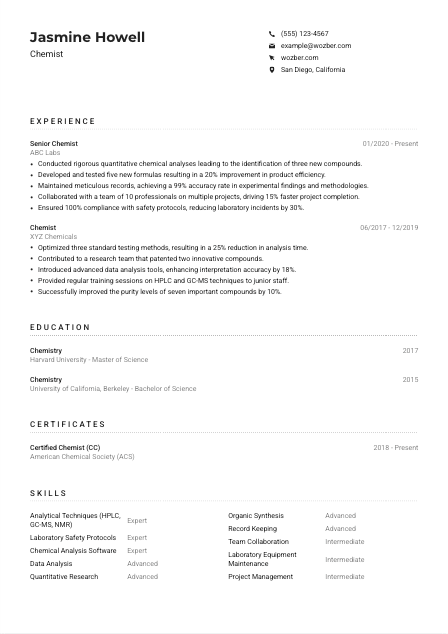
How to write a Chemist CV?
Welcome, future Chemistry dynamo! In the realm of atoms and reactions, your CV is the catalyst for your career progression. It's not just a document; it's an artifact of your achievements and potential. With the Wozber free CV builder at your side, let's embark on a mission to refine your CV into a masterpiece that resonates with hiring managers.
Whether you're a seasoned Chemist or fresh out of the lab coat from graduation, this guide will show you how to harmonize your skills with the job you're eyeing. Let's get started on concocting your success formula!
Personal Details
First impressions matter, especially in a lab report or a CV. Your contact information is your molecular signature on this professional document. Follow these steps to ensure your personal information highlights your candidacy for that Chemist role effectively.
1. Name Visibility
Your name is the label on your professional solution; ensure it's clear and prominent. You wouldn't skimp on labeling your lab samples, so apply the same consideration to your CV. Use a readable font and a size that makes your name stand out.
2. Position Alignment
Mirror the job title below your name to create an immediate connection with the hiring manager. If the job is for a "Chemist," that's the title you want to shine right under your name. This alignment signals you're not just looking for any job, you're looking for this job.
3. Contact Clarity
Accuracy is key in chemistry and in contact details. Use a professional email format like firstname.lastname@email.com. Make your phone number easily visible; ensure it's one where you can answer professional calls. Double-check for typos; an incorrect digit could be the difference between a missed opportunity and a call back.
4. Geo-Tagging
"Must be located in San Diego, California," says the job description. Highlighting your San Diego residence upfront shows you're a logistical fit, eliminating any concerns about relocation or availability for in-person interviews.
5. Web Presence
If you have a LinkedIn profile or a personal website showcasing your professional achievements, include it. Think of it like a supplementary data sheet that provides deeper insight into your professional experiments and successes.
Takeaway
Think of the Personal Information section as the instructions of your experimental procedure: necessary, clear, and precise. It establishes the who and where, setting the stage for the rest of your CV's content.





Experience
Showcase your lab successes! The Experience section is where your CV reacts vigorously, demonstrating your value as a Chemist. Let's meticulously compound your professional experiences into a coherent, impactful narrative.
- Conducted rigorous quantitative chemical analyses leading to the identification of three new compounds.
- Developed and tested five new formulas resulting in a 20% improvement in product efficiency.
- Maintained meticulous records, achieving a 99% accuracy rate in experimental findings and methodologies.
- Collaborated with a team of 10 professionals on multiple projects, driving 15% faster project completion.
- Ensured 100% compliance with safety protocols, reducing laboratory incidents by 30%.
- Optimised three standard testing methods, resulting in a 25% reduction in analysis time.
- Contributed to a research team that patented two innovative compounds.
- Introduced advanced data analysis tools, enhancing interpretation accuracy by 18%.
- Provided regular training sessions on HPLC and GC‑MS techniques to junior staff.
- Successfully improved the purity levels of seven important compounds by 10%.
1. Reaction Start
Kick off by dissecting the job description. Note the requirements: "Conduct qualitative and quantitative chemical analyses...". Match these with your own experience, emphasizing those that align directly with the job.
2. Catalyst - Roles and Companies
Structure your experience chronologically, with the most recent role first. Include your job title, employer name, and the dates of your tenure. This structure makes it easier for the ATS and hiring managers to navigate your career trajectory.
3. Formulation - Achievements
Detail your professional accomplishments, using action verbs to demonstrate efficacy. For example, "Developed and tested five new formulas resulting in a 20% improvement in product efficiency." Be purposeful; tailor your achievements to resonate with the responsibilities listed in the job description.
4. Quantification - Numbers Matter
Chemistry is quantitative by nature, and so should be your CV. Use metrics to demonstrate the scale of your contributions: "Achieved a 99% accuracy rate in experimental findings." Numbers provide tangible evidence of your capabilities.
5. Relevance - Fine Tune
In the vast laboratory of your career, focus on what's pertinent to the role you're applying for. Extraneous information dilutes the potency of your application. Highlight experiences that demonstrate your fit for the specific Chemist position.
Takeaway
Your experience section is the purest extract of your professional journey. Tailored correctly, it tells hiring managers you have the required solution to their needs. Keep your achievements relevant and quantified, and you'll precipitate interest in your candidacy.
Education
In Chemistry, as in your CV, foundation matters. Your educational background sets the stage for your expertise. Here's how to ensure your education resonates with the Chemist position, showcasing that you have the theoretical groundwork to support your practical skills.
1. Elemental Requirement
Identify and align with the key educational benchmarks in the job description: a Bachelor's degree in Chemistry or related field. List your highest degree first to immediately showcase your advanced knowledge and dedication to the field.
2. Structure and Substance
Maintain a clear format: degree, field of study, institution, and graduation year. This clarity presents your educational background as organized and straightforward, mirroring the neatness expected in a laboratory.
3. Degree Specificity
Highlight the specifics of your degree if they align with the job's demand. For roles seeking advanced degrees, like our example which prefers an advanced degree, be sure to list your Master of Science in Chemistry prominently.
4. Coursework Relevance
Should your career be at an embryonic stage or if the role is highly specialized, detailing pertinent coursework can be advantageous. This is particularly useful if you've done specialized courses in analytical techniques like HPLC, GC-MS, and NMR.
5. Academic Accolades
If you've graduated with honors or been involved in relevant research projects or publications, listing these can add another layer of credibility to your application. Tailor this information to the seniority of the role to maintain focus.
Takeaway
The Education section crystallizes your foundational expertise. By aligning it with the employer's requirements, you reinforce your suitability for the role. Present it clearly and watch your career prospects solidify.
Certificates
Certifications are additional elements that can catalyze your CV's impact. They reflect your commitment to ongoing professional development and mastery. For a Chemist, strategically selecting what to include can set your CV apart.
1. Solution Analysis
Assess the chemistry of the job description with your own qualifications. Where there are no explicit certification requirements for the Chemist position, consider what could implicitly enhance your application, such as a Certified Chemist (CC) certificate.
2. Reactivity - Relevant Certifications
Prioritize certifications that have a direct reaction with the role's requirements. A certification like the Certified Chemist (CC) from the American Chemical Society (ACS) directly correlates with professional credibility in chemistry.
3. Concentration - Dates Matter
If your certification has an expiry date or is freshly earned, include this information. This demonstrates to employers that your knowledge is up-to-date and that you're committed to maintaining relevance in your field.
4. Periodic Table of Learning
Continuously explore new certifications and learning opportunities, especially those in high demand within the chemical industry. Staying current not only enhances your CV but ensures you remain competitive in an evolving field.
Takeaway
Just as you would refine a compound in the lab, refine your CV with relevant certifications. This dedication to your craft will shine through to recruiters, much like a well-organized periodic table, it organizes and showcases your professional elements effectively.
Skills
The Skills section is your laboratory, where you mix and match capabilities to showcase your professional essence. For a Chemist, aligning this section with the job requirements is crucial. Let's catalyst the process to amplify your skills efficiently.
1. Component Analysis
Examine the job description to distill both explicit and implicit skills required. Skills such as "Strong proficiency in analytical techniques like HPLC, GC-MS, and NMR" directly map to the needs of the employer.
2. Strategic Formulation
Itemize skills that directly align with those listed in the job description. For a Chemist, listing expertise in "Analytical Techniques (HPLC, GC-MS, NMR)" and "Data Analysis" underscores your technical prowess and analytical acumen.
3. Purity and Precision
Resist the temptation to list every skill. Focus on the most relevant ones that speak volumes about your suitability for the position. This precision makes your skills section potent, catching the employer's eye with focused capabilities.
Takeaway
Just as a carefully calibrated instrument yields the best results, a carefully curated skills section can significantly impact your CV. Highlight your expertise with precision, emphasizing the skills that make you the most reactive candidate for the job.
Languages
Communication is critical, whether you're interpreting data or collaborating with an international team. The Languages section can showcase your ability to navigate multilingual environments, an asset in the globalized science community.
1. Elemental Evidence
First, identify if there's any language requirement specified in the job posting. For example, "Proficiency in English is a critical component of this role." Clearly indicate your proficiency in English, placing it prominently in this section.
2. Compound Languages
After listing the required language, include any additional languages you speak. Even if not directly relevant, they showcase your adaptability and readiness to engage in diverse environments.
3. Concentration Levels
Indicate your proficiency level honestly, whether it's "Native," "Fluent," "Intermediate," or "Basic." This transparency ensures clear communication and sets realistic expectations for your linguistic capabilities.
4. Universal Catalyst
In roles where you may communicate with international teams or interpret multilingual research, your language skills become even more valuable. Highlighting these skills can thus be a potent catalyst for your application.
5. Reaction Rate
Even basic language skills might speed up your integration into a new role or environment. Consider each language you know as an asset, showing your potential for effective communication and collaboration.
Takeaway
Your language skills are bridges to new opportunities and catalysts for connections in the scientific community. Flaunt them with pride, showing you're not just a Chemist, but a communicator ready to engage in the global dialogue of science.
Summary
Your CV's Summary is the strategic reaction equation for capturing the essence of your professional narrative. Here's how to tailor this section for the Chemist position, ensuring it encapsulates your unique formula for success.
1. Reaction Conditions
Begin with a comprehensive understanding of the job's requirements. Your summary should respond directly to these by firmly establishing you as the solution the employer seeks.
2. Initial Mixture
Introduce yourself with a succinct statement about your professional background. For example, "Chemist with over 6 years of expertise in advanced chemical analyses, formula development, and collaborative research."
3. Catalyst Addition
Inject specifics from the job description, pairing them with highlights from your experiences and skills. Aligning your expertise with the employer's needs creates a compelling narrative of why you're the right fit.
4. Equilibrium Point
Aim for brevity and impact, distilling your professional essence into 3-5 potent sentences. Your Summary is not just an introduction; it's a hypothesis of your potential contribution, inviting further examination of your CV.
Takeaway
Your Summary is your professional elevator pitch, concise yet evocative, teasing the rich content of your CV. Craft it with care, ensuring it aligns with the job requirements, and watch as it catalyzes interest in your candidacy.
Launching Your Chemist Journey
You've navigated the complex compound of CV crafting with precision and are now poised to apply for that Chemist position with confidence. Remember, a CV is more than a document—it's an evidence-based argument for your candidacy. Utilize the Wozber free CV builder, including its ATS-friendly CV templates and ATS CV scanner, to ensure your CV isn't just seen but also leaves a lasting impression. Propel your career forward as a Chemist; the lab bench of your dreams awaits!

- Bachelor's degree in Chemistry or related field;
- advanced degree preferred.
- Minimum of 3 years of experience in a laboratory setting or relevant industry.
- Strong proficiency in analytical techniques such as HPLC, GC-MS, and NMR.
- Proficient in data analysis and interpretation using software tools.
- Excellent communication and collaboration skills.
- Proficiency in English is a critical component of this role.
- Must be located in San Diego, California.
- Conduct qualitative and quantitative chemical analyses to determine the composition of substances.
- Develop and test new formulas, materials or compounds to improve product quality or efficiency.
- Maintain accurate and detailed records of experiments, findings, and methodologies.
- Collaborate with interdisciplinary teams to drive projects to completion.
- Ensure compliance with safety protocols and regulatory standards in the laboratory.





